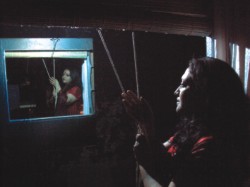| Theatre
Age of Loneliness
Ershad Kamol
 Loneliness in a materialistic society has been brought under the spotlight in Palakar's latest production Request Concert. German playwright Franz Xaver Kroetz's non-verbal monodrama Request Concert has been presented artistically by the troupe. However, both the artistic director and the actor who perform the protagonist’s character are guest artistes.
The presentation style by the artistic director Kamaluddin Nilu, who has been directing theatre performances for the last few years in European and South American countries, is very innovative in terms of design and use of effects.
The audience of the intimate theatre performance sits at the three sides of an artificially made well-furnished apartment decorated with all the required elements of a household such as TV, computer and dressing table. Through the window of the room, the audience voyeuristically watches a middle-aged woman (Rokeya Rafiq Baby) enter into the room in the middle of the night and start her household chores: She hangs her clothes, cooks her meal, tidies up the room and so on. The lonely woman finds company in the elements of her house, however, does not get any consolation, which leads her to commit suicide.
 Director Kamaluddin Nilu has done an impressive job of exploring the sense of solitude through the stream of actions, movements and sound effects, despite the absence of dialogue. Director Kamaluddin Nilu has done an impressive job of exploring the sense of solitude through the stream of actions, movements and sound effects, despite the absence of dialogue.
But, the problem with Nilu's directorial composition is that only a few parts of the performance space are visible through the small window. As a result the audience misses many activities of the actor.
Nilu's intention to demonstrate the loneliness of a woman by portraying intimate scenes as realistically as possible, becomes jarring for our cultural sensibilities. Scenes such as the woman taking a bath appear a nuisance, creating silhouettes of the actor undressing behind the white curtain of the wash room are a little discomforting. And sometimes portraying of many scenes appear unrealistics: Does a lonely woman frequently go to the wash room to change her attire?
 |
Actor Rokeya Rafiq Baby doing her household chores in the play
Request Concert, a latest production of Palakar. |
Moreover, the use of bright lights on the big window of the set does not portray a mid night scene realistically on stage.
Even the actor Rokeya Rafiq Baby seems very shy in many scenes such as when wearing short attire she shakes her body with the rhythm of music in her lonely room to pretend that she is in an orgy with friends.
She performs really well however, in the scene when she recalls the golden moments of her life while smelling her Orna.
Nine consecutive shows of Request Concert had been staged at the Palakar Studio at Natak Sarani (formerly known as Bailey Road) from February 20 to 28.
Of Japanese Animation
 These days 'Japanese animation', which is called 'anime' is becoming quite popular in the rest of the world. Anime, in combination with manga (Japanese comics), is extremely popular in Japan and well known throughout the world. These days 'Japanese animation', which is called 'anime' is becoming quite popular in the rest of the world. Anime, in combination with manga (Japanese comics), is extremely popular in Japan and well known throughout the world.
Anime can be released either by television broadcast or released directly to video, in which case it is often called OVA or OAV (Original Animation Video). Sometimes, anime can be hand-drawn or computer generated. It is used in television series, films, video, video games, commercials, and internet-based releases, and represents most, if not all, genres of fiction.
“Doraemon the Movie: Nobita's Dinosaur 2006”, featuring a cat-like robot named Doraemon from the 22nd century, has achieved huge success as anime during the last few years.
.Doraemon is afraid of mice and hates rats, after having his ears eaten by them.. It carries amusing tools in its fourth-dimensional pocket on its abdomen. Doraemon was sent back to the 20th century to help the protagonist of the animation film named Nobita.
This popular anime will be screened in Bangladesh on March 6 at 4:30 p.m. at the National Theatre Stage as part of the weeklong cultural programme titled “Japan Cultural Festival 2009” jointly organised by Embassy of Japan in association with Bangladesh Shilpakala Academy has organised a weeklong programme at the academy.
The festival will include an Ikebana contest and demonstration, bonsai exhibition, screening of an animation film and staging of a theatre performance.
Bangladesh Shilpakala Academy will stage a Bangla Translation of Japanese play titled Eksho Bosta Chaal March 7 at 5:30 p.m. at the National Theatre Stage of the academy. Recently the Shilpakala Acedemy production of the play has won the Uchimura Prize conferred by the International Theatre Institute.
The Japanese Cultural Week has been organised as a part of the bilateral cultural exchange programme between Bangladesh and Japan.
Copyright
(R) thedailystar.net 2009 |
